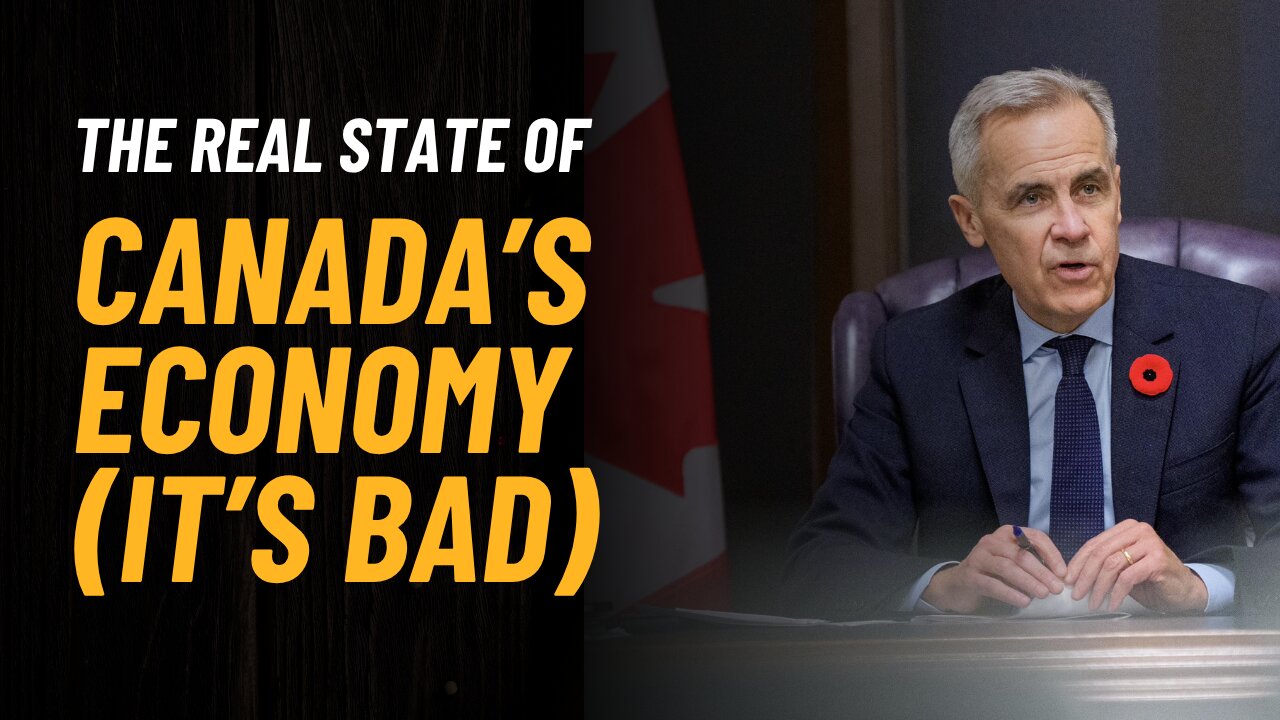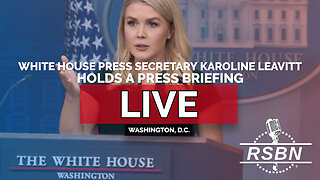Premium Only Content

Canada on the Brink?
The hosts open with alarming new data showing Canadian consumer insolvencies have surged to their highest level since 2009, with Ontario, Alberta, and Quebec hit the hardest. They argue this spike exposes the disconnect between the government’s rosy unemployment claims and the reality facing households. As they explain, the official unemployment rate only counts people actively seeking work, excluding those who have given up entirely. They also stress that the vast majority of new jobs celebrated by the Liberals are low-paying, part-time retail positions that offer little stability and no benefits — an unsustainable foundation for a struggling economy.
They pivot to the parallel rise in business insolvencies, now at a 15-year high. High inflation, soaring operational costs, and collapsing consumer spending have pushed many companies to the brink. The hosts connect this to reports that one in three Canadians are skipping meals to pay bills, calling it an “insane” statistic for a G7 country. They note that food-bank usage has surged to unprecedented levels, with one in four Canadians now relying on food banks — not as an occasional safety net, but increasingly as a core part of monthly survival. These trends, they argue, paint a picture of a country in deep economic distress, despite government messaging.
The conversation shifts to a major new warning: Fitch Ratings may cut Canada’s credit rating from AA+ to AA due to ballooning federal deficits. The hosts emphasize that this isn’t an abstract concern — a downgrade would increase borrowing costs, push mortgage rates higher, and further strain household budgets. They also highlight comments from Bank of Canada Governor Tiff Macklem, who recently cautioned that unless conditions change, Canadians’ living standards will decline. Combined with a survey of 30 major Canadian economists now assigning a 30% chance of renewed inflation by March, they argue the financial outlook is far more dire than officials admit.
They then dig into what they describe as deep-rooted government mismanagement. From the pandemic’s free-for-all spending to scandals like the SDTC affair and $6.2 billion in climate-program funds labeled internally as a “tick-box exercise,” the hosts argue that Ottawa became addicted to spending without oversight. They cite internal evaluations from the Department of Foreign Affairs — not opposition critics — showing billions wasted on rushed, poorly designed initiatives. They also point to Liberal MP Arielle Kayabaga’s $175,000 in personal costs over nine days as an example of systemic irresponsibility.
The discussion intensifies around the parliamentary budget officer. The temporary PBO publicly criticized federal spending as “stupefying, shocking, and unsustainable.” Now, the government is seeking a permanent replacement described as needing “tact” and “discretion” — terms the hosts interpret as code for installing a compliant figure who won’t challenge Liberal narratives. They frame this as part of a broader pattern: massaging statistics, omitting key data like capital outflows, and reshaping oversight roles to blunt criticism rather than address underlying fiscal problems.
Finally, they situate the insolvency crisis within Canada’s political crossroads. Even if conservatives win power, they argue, the next government will inherit unprecedented debt, weakened institutions, and years of policy inertia tied to international influences like the WEF. With 11 MPs still under foreign-interference scrutiny and investment fleeing the country amid higher carbon taxes and anti-business policies, the hosts warn that reversing the decline will be extraordinarily difficult. They close on a sober note: hope for improvement remains, but Canadians should prepare for more economic pain before any recovery begins.
https://betterdwelling.com/canadian-insolvencies-accelerate-hit-highest-level-since-2009
https://betterdwelling.com/fitch-warns-canada-of-credit-downgrade-thats-bad-news-for-mortgages
https://betterdwelling.com/bank-of-canada-survey-puts-1-in-3-odds-of-recession-by-march-2026
https://www.cbc.ca/news/politics/parliamentary-budget-officer-job-posting-9.6976713
https://www.blacklocks.ca/govt-calls-it-vacation-pay
https://www.blacklocks.ca/hid-data-from-budget-office
0:02 – Consumer Insolvencies Hit 2009-Level Highs
1:13 – Part-Time Retail Jobs Inflate Employment Numbers
2:39 – One in Three Canadians Skipping Meals
3:39 – Business Insolvencies Reach 15-Year Peak
5:53 – Fitch Signals Possible Downgrade to Canada’s Credit Rating
6:32 – Economists Warn of 30% Chance of Renewed Inflation by March
7:01 – Tiff Macklem: Living Standards Will Fall Without Change
8:32 – $6.2 Billion Climate Program Deemed “Tick-Box Exercise”
9:47 – Parliamentary Budget Officer Calls Spending “Unsustainable”
11:03 – Government Seeking a More “Tactful” PBO
11:56 – Concerns Over Investment Outflows Hidden from Public
14:00 – Carbon Tax and Net-Zero Policies Increasing Business Costs?
15:39 – Minority Government Complications and Political Gridlock
16:47 – Closing Argument: Mismanagement, Decline, and What Comes Next
-
 59:30
59:30
The White House
2 hours agoPress Secretary Karoline Leavitt Briefs Members of the Media, Nov. 20, 2025
2.02K6 -
 2:06:37
2:06:37
Steven Crowder
4 hours agoJasmine Crockett's Epstein Idiocy & the Absolute State of the Democrat Party
401K259 -
 LIVE
LIVE
Sean Unpaved
2 hours agoAre Josh Allen & Bills On UPSET ALERT vs. Texans? | UNPAVED
105 watching -
 2:06:44
2:06:44
Side Scrollers Podcast
3 hours agoRoblox Kids TRANS Game + Pokimane ROASTED AGAIN + More | Side Scrollers
13.2K5 -
 2:05:47
2:05:47
The Charlie Kirk Show
2 hours agoTP Action Update + Mogadishu Minnesota + Replacing ObamaCare | Bowyer, Thorpe, Cremieux | 11.20.2025
29.3K6 -
 3:08:29
3:08:29
Right Side Broadcasting Network
4 hours agoLIVE REPLAY: White House Press Secretary Karoline Leavitt Holds a Press Briefing - 11/20/25
29.8K9 -

Rebel News
1 hour agoCBSA refugee revelation, No oil tankers in BC, Notwithstanding clause debate | Rebel Roundup
4.4K1 -
 LIVE
LIVE
TheAlecLaceShow
2 hours agoGuests: Scott Jennings, Senator Marsha Blackburn, Del Bigtree | The Alec Lace Show
77 watching -
 1:01:04
1:01:04
The Rubin Report
3 hours agoThe Exact Moment CNN Host Realizes Jasmine Crockett Is a Monster
30.5K69 -
 LIVE
LIVE
LFA TV
16 hours agoLIVE & BREAKING NEWS! | THURSDAY 11/20/25
2,144 watching